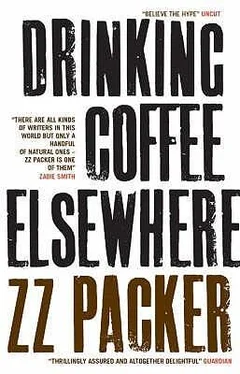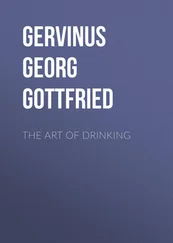“Your arm,” he said. “What happened?” His voice had suddenly gone gruff, as if he were prepared to pummel the sidewalk that had done this to her.
In the park, she’d rolled her blouse sleeves to her elbows to air the wide scrape on her arm, and now she saw that it looked worse than the last time she’d checked it. Her brown skin had been stripped away to reveal the raw pink underneath. “I don’t know,” she said, trying to sound casual about it. She didn’t want to go into the details of the day: the screaming woman, the men chasing her. “I don’t even remember.”
She could tell Dezi didn’t buy it, but he let it go. “That could get infected. You got to get that cleaned up. Where you live? I’ll take you home.”
She ate the rest of her burger. “That’s all right. I live a long ways away.”
Dezi wiggled his pinky finger in his ear. “What’s your name?”
She hesitated, stunned that she hadn’t told him earlier, then realized that she somehow expected him to just know it, the way he seemed to know everything. “Tia,” she said. “It means ‘aunt’ in Spanish.”
“All right, Tia. Let me put it this way. I know you don’t have a place to stay.” He looked at her significantly, giving her time to protest if she felt like it. “I’ll make sure that it gets disinfected. But if you want to sleep on the street — fine.” Dezi held his hands up like a man getting frisked. “You can sleep on the street, but I’d rather you didn’t. I try to watch over people.” He studied her face as if making sure she was following him.
“No offense,” she said, “but I don’t know you.” The words surprised her, her tone was strong. She tried to make her face match it.
Dezi looked as though he was hurt by this, but determined not to show it. “My bad, my bad. I just felt a connection.”
She felt suddenly wise, even grateful, that this was happening to her, that one day she’d be able to rasp hoarsely at some young girl, telling her all the things she’d learned on the streets, the hard way. She was not going to be lured by some man who felt “a connection.”
“A connection?” she said, emboldened. “How can you just feel a connection? A connection doesn’t just exist in the air, in outer space, by itself.” She waved her arms wildly.
Dezi raised his eyebrows, smiled painfully. “Girlfriend, you think I’m into you. Nuh-uh . I just—” His voice quavered, as though he was on the verge of tears. “I just … it’s just that you’re so young . I tell you what — I don’t have no babies running around by three different mamas like some a these hand-to-dick men out here. Not Dezi. What I do got is a niece. Younger than you. But guess what? You remind me of her. Big pretty eyes, hair in a ponytail. I see you here with your Happy Meal and that scrape on your arm and I want to do something for you. Like I’d do for my niece.”
He read her face and held up a single hand to put a stop to any apologies she might make. “As I aforementioned, I don’t want you out on no street, no place to lay your head, trying to scrape up enough money for the next hamburger.” He felt the pocket of his synthetic jumpsuit, pulled out a wad thicker than any billfold she’d seen, and peeled off a fifty. “Take it, honey. You don’t have to talk to me ever again. If I see you here, I’ll pretend I don’t know you. But I want you to take this so I can sleep easy tonight.”
She was dumbstruck.
He insisted. “Take it for my sake. So I won’t have to imagine my niece out in the cold.”
Besides the fact that it wasn’t cold out at all, she couldn’t believe how wrong she’d been about Dezi. She was no better than her aunt Roberta, who railed against all men who weren’t church members, calling them low-life no-good, no-account fathers. A surge of affection rose in her for Dezi, for his protectiveness, for the pain in his eyes. This man had paid for her food out of anonymous generosity, and though she badly needed the fifty dollars, she forced herself to say, “I can’t take your money.”
Dezi put the bill back in his pocket. “Then, at the very least,” he said, “allow me to clean your wound.”
DEZI DROVE her to his apartment on Northside Drive. He drove a tan Celica, and the whole ride he talked on a cellular phone in the deep voice of a midnight deejay. He mostly talked about some ball game, but sometimes he would just say, “Yeah,” in a way that seemed shorthand for things he didn’t want her to hear.
The staid stores of Virginia Avenue gave way to grillework-caged liquor stores with names like Max’s and The Place, and more to the point, Liquor Here. Some businesses gave no indication as to what they might be selling, their signposts were signless, their neon neonless.
The only spots of color were the billboards and the prostitutes. The billboards all advertised Kools or Newports, and against the green backdrops, beautiful black people wore toy-colored clothes. They were shown sledding, or skiing, or some other activity involving snow, all of them somehow managing to hold on to their cigarettes.
It was a hot autumn, and the girls wore outfits that would have made Aunt Roberta shut her eyes and shake her head. Denim sets with short fringed skirts and shirts with sleeveless, plunging necklines. Bandeaus and skintight pants that outlined their pubic bones like an X ray. The guys wore the same style of swishy synthetic jumpsuit that Dezi wore, or else low-riding jeans with big boxy designer T-shirts.
The prostitutes — Tia assumed they were prostitutes — wiped sweat from their faces, slinking around in abbreviated versions of evening wear. It shocked her that not all the prostitutes were women in the strictest sense: men — transvestites, she imagined — looked like catwalk versions of the real women: their legs longer, their skirts shorter, their faces more carefully drawn on. When men cruised up to the curbs, they were so nonchalant about their business it seemed as if they were merely giving directions to a passing stranger. It fascinated her, and Dezi seemed to register her fascination, occasionally slowing the car to a cruise.
The children seemed unaware that anything was wrong. When Dezi stopped at a red light, she watched a chubby girl wield a snaky water-spouting hose, sending a throng of shirtless kids flying into alleys and abandoned lots. On a sidewalk, a Puerto Rican — looking kid bounced a ball to a black kid, and the black kid caught the ball with one hand, taking a drag off a cigarette with the other.
“Here it is,” Dezi announced, parking the car. “The famous Stanford Gardens.”
She got out and shut the car door. The closest thing to a garden she saw were the geraniums a few people were trying to grow from windowsill mayonnaise jars. Dezi laughed at the look on her face and took her hand. “C’mon, Miss Tia, laugh sometime.”
She unlatched her hand from his, pretending to attend to her scrape. “I wonder if it’ll heal?” she said, knowing that it would, but needing something to say to account for her hand’s removal.
“I’ll take care a that.” He put his hand around her shoulder and before she could think of a way to remove it, a group of kids appeared, wreathing about them.
A little boy about seven years old with smooth brown skin and hair as straight as an Indian was apparently the leader of the group. “Dez-zeeeee!” he singsonged, blocking their path. Dezi playfully tried to fake the boy out, but he would not let go of Tia, dragging her along. “Go away, Gerard. Can’t you see I got a young lady here who ain’t used to little hoodlums stinking up the way?”
All the children except the one named Gerard made twinkling voodoo motions with their fingers. “Oooooo! Dezi’s got a new wo-maaaaan!”
Читать дальше












